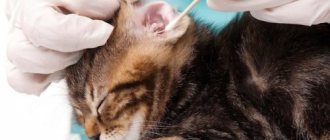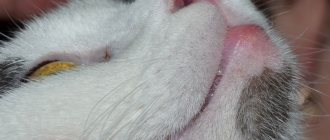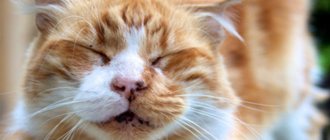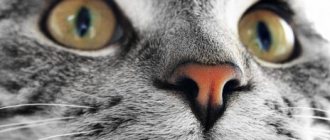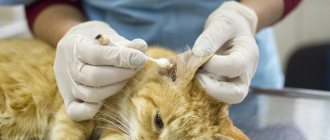Halitosis is the appearance of an unpleasant odor from the mouth, a fairly common reason for cat owners to visit a veterinarian.
The reason for the appearance of a repulsive odor from the mouth can be various factors - from diseases of the oral cavity to damage to internal organs. The smell emerging from the pet’s mouth can have a different hue - ammonia, ichorous, putrefactive, depending on the provoking factors.
Diseases of teeth and gums
One of the most common reasons for the appearance of an unpleasant odor from the mouth of an animal is diseases of the teeth and gums. In the absence of proper oral hygiene in a cat, pathological changes occur. A faint smell of raw fish begins to come from your pet’s mouth. This is the first signal for the owner. It is recommended to seek help from a veterinarian.
Pathologies such as tartar and inflammatory processes in the gum area and nearby tissues negatively affect the condition of the mucous membranes of the oral cavity and teeth.
How to treat
What to do on your own
If there is plaque or small deposits on your teeth, you can try to remove them yourself. At the veterinary pharmacy you can purchase a special paste or gel, brush or finger attachment.
It’s good if your pet is accustomed to brushing its teeth since childhood. He will experience less stress. To keep the cat from getting nervous, instead of a brush, you can wrap your finger in a cloth, moisten it with water and apply the paste.
If there are wounds on the mucous membrane, they must be treated with an aqueous solution of chlorhexidine, miramistin or any other antiseptic. This will help kill bacteria and speed up healing.
For inflamed gums, you should purchase ointment from a veterinary pharmacy.
Treat the cat with a course of antiparasitic medication if this is the problem. You can choose drops, tablets or suspension, at the discretion of the owner. It is more convenient to use liquid products; they can be mixed with wet food. Some cats may categorically refuse pills.
Sometimes a change of diet is enough . Remove fish or food containing fish from the cat’s diet: canned food, dry or liquid food. Replace cheap ones with flavorings and preservatives with more expensive and high-quality ones. Dry food is required in the diet. If it is chosen incorrectly, in addition to the smell, this can be easily determined by a change in stool - diarrhea or vice versa, as well as vomiting.
During the treatment process, you can use special odor eliminating agents. They are available at the pet store. However, they are not a substitute for full treatment.
In some cases, you should immediately contact a veterinarian. To find out the cause, he will prescribe diagnostics. This may be an ultrasound examination, urine, feces and blood analysis, x-rays, smears from the oral mucosa.
How to get rid of an unpleasant odor with the help of a doctor
In case of tartar and severe damage, cleaning is carried out only in a clinic. This painful procedure is performed under general anesthesia or using sedatives.
Ultrasonic cleaning is mainly used. In older animals, blood and urine tests are first taken to rule out other diseases. Throughout the treatment period, it is necessary to monitor the cat’s heart function.
If replacing baby teeth in kittens is difficult, the doctor will remove them, and the new teeth will continue to grow and form quietly.
When suspicion falls on serious diseases of the oral cavity, for example, pulpitis or periodontal disease , X-ray diagnostics are performed.
If there is a metabolic disorder, the doctor selects a diet and regimen. He will tell you what type of food to use. Most likely, he will advise you to remove ordinary “human” food - meat, fish, raw eggs.
To identify diseases of the internal organs, the animal’s blood and urine are examined. The veterinarian prescribes the necessary medications depending on the disease. To treat kidney and liver diseases, as well as diabetes, in addition to medications, a special diet is prescribed.
In some cases, medication is not enough and surgery may be necessary.
Some problems can be solved on your own at home, but in any unclear and difficult situation it is better to go to the clinic. To avoid running into doctors who want to make money from ill-informed owners, you should read reviews on the Internet or ask friends and relatives.
Diseases of the gastrointestinal tract
Diseases of the digestive system can cause a repulsive odor from a cat’s mouth. Dysbacteriosis is a common factor that provokes the appearance of halitosis. The reason is the rapid growth and development of anaerobic opportunistic microorganisms.
Dysbacteriosis is an imbalance of microflora that occurs as a result of poor nutrition or a sharp decrease in the body’s immune forces.
If a cat has a strong smell of acetone from its mouth, this may indicate a problem with the pancreas. Carbohydrates stop being absorbed when there is a lack of insulin produced. Metabolism slows down, and toxic substances such as acetone and ketone bodies are formed from unbroken carbohydrates.
If you notice increased thirst in your pet combined with the smell of acetone from the mouth, it is recommended to visit a veterinary clinic as soon as possible. Symptoms may indicate the development of diabetes mellitus. The animal needs qualified help.
The occurrence of an unpleasant odor from a cat’s mouth may be due to the development of diseases of the gastrointestinal tract such as:
- gastritis;
- ulcerative damage to the walls of the stomach;
- tumor processes;
- intestinal obstruction;
- infectious pathologies.
Halitosis also occurs with serious helminthiasis. Infestation of the body by parasites requires immediate action on the part of the host. It is necessary to administer antihelminthic drugs twice in the correct dosage.
An unpleasant odor from the cat's mouth may be a sign of the development of liver disease. From the animal's mouth comes a sweetish, nauseating odor reminiscent of rotten flesh. The main filter organ neutralizes toxic substances and removes them. When the liver functions abnormally, toxins accumulate in the body, causing intoxication.
If you notice a sweetish odor reminiscent of rotten meat, a change in the shade of the visible mucous membranes and yellowness of the whites of the sclera, you should immediately seek help from a veterinarian.
Why does a cat's breath smell?
Causes of odor in a kitten or young cat:
- difficulties when replacing baby teeth - for example, pieces of food get stuck between old and new fangs;
- injury to the oral mucosa with sharp pieces of food, dry food, toys;
- incorrect development of bite;
- various viral infections.
There can be no other reasons at a young age other than chronic diseases.
Why a bad odor may appear in adults:
- Problems with teeth: the presence of stone, pulpitis, caries, periodontal disease, periodontitis.
- Oral diseases: gingivitis, stomatitis, cysts, glossitis, papillomatosis, various formations and wounds, ulcers.
- Breeds with flattened faces: exotics, Persians, Scottish Folds, British Shorthairs, Himalayan cats. They have a genetic predisposition to dental diseases.
- Diseases of internal organs: problems with the kidneys, gastrointestinal tract, liver, respiratory system, urinary system.
- Poor nutrition – often the presence of fish in the diet contributes to the appearance of odor.
- Colds such as bronchitis or sore throat.
- Parasites, worms, helminths.
- Benign or malignant tumors.
In cats over 9 years of age, the cause of bad breath is most often diabetes, kidney problems, neoplasms, or age-related diseases.
Kidney diseases
The appearance of an unpleasant odor of ammonia in a cat’s breath is a sign of serious problems in the functioning of the kidney structures. An ammonia odor from the mouth may indicate the presence of kidney failure. This occurs as a result of a decrease in urine production in the kidneys, but the level of urea and creatinine increases. In parallel with the smell of ammonia from the mouth, kidney disease in a pet is indicated by:
- increased thirst;
- frequent urge to urinate;
- painful sensations (when the owner tries to touch the cat’s kidney area, the animal becomes restless).
Pathological changes in the kidney area can occur due to an incorrectly selected diet, infectious diseases, or against the background of hypothermia.
At the initial stages of pathology development, it is easiest to help an animal. Therefore, it is important not to miss the onset of the disease. Otherwise, the risks of developing irreversible processes in the kidneys are incredibly high.
What Causes Bad Smell
It is natural for a healthy animal to smell from its mouth. However, if a cat has a strong and unpleasant odor from her mouth, you should suspect that she is sick. Mouth stench may be intermittent or present all the time. There are many reasons for its occurrence.
Change of dentition
As a rule, a kitten’s bad breath is a consequence of the replacement of one generation of teeth by another. In different breeds, the dentition changes between the ages of six months and 8 months. During this period, the owner notices redness on the baby’s gums and inflammation.
No treatment is necessary. Once the process is complete and the main teeth grow in, the smell will stop.
The help of a veterinarian is required when the baby tooth does not want to fall out, and because of this the permanent tooth does not erupt.
Bad food
The reason why a cat's breath smells is often related to diet. It is observed in animals fed with industrial economy-class food. An unpleasant aroma also appears if the pet has eaten spoiled or specific foods.
Objects stuck in the mouth
A stuck fish bone, thread, splinter or any other foreign object that remains in the animal’s mouth for a long time can cause an inflammatory process and, as a result, an unpleasant odor.
Viral diseases
Infectious diseases, the symptoms of which appear in the oral cavity, are also the cause of bad breath. The most common are calicivirosis and rhinotracheitis.
Dental diseases
A specific smell can be caused by any dental problems: caries, loss of a canine tooth, tartar.
Gingivostomatitis is an inflammation of the oral cavity that causes a painful condition. The cat refuses to eat and is losing weight. Due to the addition of a bacterial or fungal infection, the mouth begins to smell unpleasant and strong.
Periodontitis is an inflammation of the tissues surrounding the tooth and is one of the main causes of tooth loss. The disease develops due to malocclusion and abnormal position of the dentition. Pathology can also be caused by feeding the animal predominantly soft food, which does not provide natural mechanical cleansing of plaque from the teeth.
Causes of acetone odor from the mouth
Acetone is a product of incomplete breakdown of proteins and fats; normally, a certain amount of this substance is always present in the human blood, but a sharp increase in its concentration causes not only bad breath, but also serious disturbances in the functioning of the brain and internal organs, which can lead to development of ketoacidotic coma.
The main reasons for increasing the concentration of acetone in the blood:
Diabetes mellitus – it is the smell of acetone from the mouth that often becomes the first symptom of type 2 diabetes mellitus that attracts the patient’s attention. This disease is common in older people who are overweight.
The accumulation of lipids in the body and an increase in fat mass causes a decrease in the sensitivity of cells to insulin, which is why glucose from food simply stops being absorbed. The body is starving, despite the large amount of glucose in the blood, and begins to use other sources of nutrition: first, glycogen reserves are broken down (they are enough for about 1 day), then fat cells and proteins are used, and at this stage the smell of acetone from the mouth may appear ;
Fasting and following strict diets - voluntary refusal of food or eating only protein foods, for example, following the principles of separate nutrition, the Attkins diet, and so on, leads to the breakdown of fat and protein cells. At the same time, the level of glucose in the blood drops, and the body begins to break down other cells - fat and protein.
A strong odor of acetone from the mouth with a decrease or complete absence of appetite can occur with tumor processes or infectious diseases, as well as with anorexia nervosa. Any of these conditions requires specialized medical care, so you cannot postpone visiting a doctor;
Diseases of the kidneys and liver - the kidneys and liver are excretory organs; they filter all substances that enter them, retain and remove unnecessary ones. If the functioning of these organs is disrupted, the amount of acetone and other harmful compounds in the blood increases. But the smell of acetone from the mouth in such diseases usually appears only in the later stages of the disease and is accompanied by other symptoms that make it possible to accurately establish the diagnosis;
Diseases of the thyroid gland - thyrotoxicosis or increased secretion of thyroid hormones causes activation of metabolic processes and increased breakdown of proteins and fats, which in turn leads to the appearance of the smell of acetone from the mouth.
Thyrotoxicosis is characterized by a change in the behavior and character of the patient: he becomes irritable, hot-tempered, and subject to rapid mood swings. There are also problems with sleep, increased appetite against the background of general weight loss and exophthalmos - enlargement of the eyeballs;
Infectious diseases - the appearance of the smell of acetone from the mouth during infectious diseases indicates severe dehydration of the body and massive breakdown of proteins. This condition often occurs with intestinal infections and requires immediate medical intervention.
The cat's breath stinks of rotten meat: disease prevention
Protecting domestic cats from fleas and worms is the prevention of many diseases. Even if your pet does not leave the apartment, periodically check its fur for fleas. If the cat goes outside freely, use flea collars or drops. Worms can appear in cats from contact with other animals, contact with contaminated food or soil. Why is infection with worms dangerous? By multiplying in large numbers in the body, worms can cause inflammation of the cat’s intestines, the smell of rotten meat from the cat’s mouth, intestinal blockage and even the death of the pet.
It is important to prevent infection with worms by deworming regularly every three months. Every veterinary pharmacy will offer you affordable deworming products for cats.
Fleas, especially during infancy, can cause poor growth and poor appetite in kittens. Sometimes, the health of infected kittens is so poor that their lives are in danger. Small kittens can be washed with flea shampoo; aggressive flea products should not be used.
Usually they fight fleas first, and then worms. The break between these procedures, due to the aggressive effect on the cat’s body, is at least a week. If there is a suspicion of a large number of worms and the cat is not eating well, deworming is first done.
What can you do at home?
If your cat has bad breath, it is important to understand that treating the animal at home is dangerous. However, the owner needs to examine the pet and try to help him, if possible.
To remove the stench, the root cause must be eliminated:
- If there are ulcers and redness, treat the oral cavity with a solution of Miramistin or a product containing chlorhexidine.
- If plaque is detected, your teeth will need to be cleaned. This can be done with a brush and paste or by wrapping a piece of gauze around your finger. However, if the animal is not accustomed to hygiene from childhood, most likely difficulties cannot be avoided. As an alternative to toothpaste, you can consider special toys. Severe dental plaque can only be removed by a veterinarian.
- If a foreign object is found during inspection, you can try to pull it out.
Treatment of halitosis
The main rule: no self-medication !
Why cats have stinking breath should be determined by a veterinarian after conducting an appropriate examination of the animal. When the cause is established, you should adhere to the treatment regimen prescribed by the doctor.
If your cat has had problems with teeth and tartar, the bad odor will disappear after her teeth are treated and cleaned of plaque and tartar.
If helminthiasis (worms) is detected, the animal is given antiparasitic treatment. More serious problems with internal organs require medication and dietary adjustments.
What to do at home
It is extremely difficult to treat a cat’s teeth at home, and other diseases can only be cured in a hospital setting. All that cat owners can do on their own is to provide their pet with ideal conditions for recovery.
In some cases, owners will have to inject themselves and give tablets prescribed by a veterinarian.
Cat nutrition plays an important role during the period of treatment and recovery. It is selected according to the state of health and type of disease
Basically, it should be light, high-calorie food, soft, not traumatic to the tissues of the mouth, and easily digestible.
Diagnosis and treatment of common diseases
First, your veterinarian will examine your cat's tongue, roof of the mouth, and back of her mouth to determine the source of her bad breath. Ask the owner how the animal’s behavior has changed recently.
Tell your doctor if:
- the pet starts to eat and jumps back;
- opens mouth with difficulty;
- hiding or aggressive;
- there was diarrhea;
- drinks a lot and often;
- problems with urination appeared.
If your animal's mouth has a foul odor due to gingivitis and hard plaque, general anesthesia will be needed to clean the enamel. Therefore, a full examination is prescribed with a biochemical analysis of blood and urine to assess the condition of the internal organs. Here it is important to note the slightest impairment of renal function, in which anesthesia is contraindicated. Consultation with an anesthesiologist is required. Ultrasound of the heart and abdominal cavity is recommended.
Additional tests are carried out to identify:
- immunodeficiency of cats;
- viral leukemia;
- Bartonella infection;
- calcivirosis.
Even a doctor with long-term practice is not always able to quickly identify the disease that causes halitosis. Here's a cat dentist's experience. He treated a young cat with a severe form of caries. Judge for yourself: the animal is two years old, and its mouth smells like garbage. Teeth turn black, but otherwise healthy. Local treatment of the gums was unsuccessful. There was nothing to do, I had to immediately pull out four molars. And only then did the veterinarian realize that the animal’s lower jaw was suspiciously soft. It turned out that focal osteoporosis also occurs at such an early age. Nothing, calcium supplements quickly dealt with the disease. The incisors and fangs turned white, and the smell disappeared.
When is veterinary help needed?
Red gums are treated and tartar is removed by a dentist using ultrasound equipment. After the procedure, the doctor applies antiseptic applications, recommends soft nutrition (pates, minced meat) and vitamin supplements.
Teeth cleaning from tartar is carried out by a dentist under general anesthesia of the cat.
If pathologies of internal organs and viral diseases are detected, therapy with antibiotics and hormonal drugs is prescribed. For local treatment, Miramistin is used, which does not have a bitter taste.
For cancer and autoimmune diseases, surgical intervention is required. For example, swelling of the salivary glands is opened so that the accumulated fluid flows out, and the formed stones are removed.
If a pet is infected with worms, the parasites are expelled with anthelmintic drugs according to the regimen prescribed by the doctor.
For helminthic infestations that cause a bad odor from the pet's mouth, anthelmintic drugs are used
How to help your pet yourself
If your mustachioed friend is completely healthy, but the pungent smell of fish is still coming from his mouth, you will have to come to terms with the fact that the cat loves canned tuna and is not going to change his gastronomic preferences. At the same time, to eliminate the aroma of food, you can purchase a suitable product.
To combat cat mouth stench, manufacturers produce several different formulations. They differ in the method of application. Tablets containing chlorophyll inhibit the proliferation of putrefactive bacteria, which prevents the occurrence of halitosis. They are given twice a day along with food. Dried seaweed powder has the same effect. In addition, it dissolves plaque on the teeth. Contains a lot of iodine, so it is not given to cats with hyperthyroidism.
Orozyme Gel is a patented product designed to effectively combat plaque, tartar and inflammation.
Judging by personal experience, my favorite one likes Orozyme gel (Belgium). It contains salivary enzymes and flavoring agents. Safe for animals of any age, including kittens. The treat not only improves and freshens your breath, but also dissolves mineral salts accumulated on the tooth enamel. Squeeze out 1 cm of gel from the tube and apply to the gums once a day. The cat licks it off with pleasure.
Among the hygiene products for domestic predators, there is a special liquid that is added to drinking water. It contains chlorine dioxide and preservatives. Dosage: half a measuring cap per 450 ml of water. Neutralizes pathogenic bacteria in the oral cavity and digestive tract. Designed for adult animals not prone to allergies.
When a kitten's teeth change, you need to examine the baby's mouth more often. If the gums become red and inflamed, they are wiped with a chlorhexidine solution. They feed pureed food, adding calcium and phosphorus to it.
Of course, cosmetics cannot replace professional cleaning of tooth enamel at the dentist. But if there are contraindications to anesthesia, their use is the best option.
Video: doctor's advice on combating the stench of a cat's mouth
Oral diseases
Let us dwell on the pathologies that most often cause an unpleasant odor and require the intervention of a specialist:
Stomatitis
There are several types of the disease. The most dangerous are ulcerative and gangrenous stomatitis. The latter type is accompanied by an extremely unpleasant odor, reminiscent of rotten meat. Stomatitis leads to inflammation of the gums, and with them, in the extreme stage, other parts of the oral cavity such as the tongue and palate suffer.
Obvious signs of the disease include: excessive salivation, abundant plaque on the tongue and gums, redness and swelling of the mucous membrane.
Tartar
This cannot be called a full-fledged disease. Rather, it is a lack of dental hygiene. Leftover food accumulates and gradually rots. Without visiting a veterinarian or cleaning your teeth at home, tartar formation can lead to serious consequences. Bad breath will be the least of your troubles.
How to determine the formation of tartar? Firstly, the gums become red, inflamed, and often bleed. Secondly, the cat tries to relieve the itching and reach the damaged areas with its paw. Thirdly, profuse salivation. Fourthly, in advanced cases, teeth simply fall out.
Glossitis
The disease can cause the already described tartar or the development of pathogenic microorganisms in the oral cavity. One of the most important side effects is that it is painful for the animal to swallow; he refuses any food, and in rare cases, water. The symptoms are generally similar to other dental diseases: bad breath, inflammation of the gums, swelling of the mucous membrane, etc.
Pharyngitis
Accompanied by inflammation of the oral mucosa. Occurs due to the development of microorganisms after damage to the oral cavity. In rare cases, the disease is provoked by the systematic intake of very hot or cold food. Interestingly, pharyngitis is most often recognized by bad breath, because other causes are extremely difficult to recognize without the intervention of a specialist.
Gingivitis
Conventionally, it can be called a type of pharyngitis. Their main difference is in the affected area. Gingivitis develops in a specific area of the mouth. For example, the gums on the left side or part of the back teeth, etc. Unfortunately, the disease progresses quickly and leads to serious illness. In most cases, it can be recognized only by bad breath.
Malocclusion
This point stands apart. It is not classified as a disease. Most often, malocclusion occurs in kittens. It comes in two types. Underbite, when the upper jaw protrudes much further than the lower jaw. But it is quite rare.
An undershot occurs when the lower jaw protrudes slightly compared to the upper jaw. This gives some breeds a certain charm. It is advisable to treat it in infancy. Otherwise, the jaw will be fully formed and it will be more difficult to correct anything.
Some other diseases are also accompanied by bad breath. For example, caries or periodontitis. But this happens much less frequently than in the cases described above.
Common Causes of Halitosis
Very conditionally, the causes that cause halitosis in cats can be divided into four large subgroups. The owner is not always able to diagnose it on his own - sometimes the help of a veterinarian is required.
Diseases of the mouth and teeth
Dental diseases can be both serious and easily solvable conditions:
- Stomatitis and gingivitis are inflammatory processes of the gums, palate and inner surface of the cheeks.
- An abscess is a closed, encapsulated abscess formed as a result of the entry of a foreign body that provokes inflammation.
- Changing teeth in a kitten can cause bacterial growth and, as a result, a bad odor.
- Plaque and tartar can cause halitosis.
These problems are easily treated, especially at the initial stage. Plaque and tartar can be avoided through prevention, that is, regular brushing.
Diseases of the nasopharynx
Halitosis is a common accompaniment of polyps in the nasal passages. Once they are removed, the stink disappears.
Mustachioed friends also suffer from such human diseases as sinusitis and sinusitis. The symptoms are similar to a runny nose: discharge from the nose and eyes, frequent sneezing, and sometimes the animal’s temperature rises.
Viral diseases can also manifest themselves, which often cause the death of a pet. At the first alarming signs and lethargic state of your pet, do not be too lazy to go to the veterinarian.
Problems with internal organs
Diseases of internal organs are more common in older animals. Usually the stench occurs when there are problems in the gastrointestinal tract, tumors and neoplasms in the liver, stomach, lungs, etc.
Diabetes in older cats does not promote fresh breath, nor does reverse reflux or pneumonia. Severe conditions require mandatory treatment under the supervision of a specialist.
Parasite infestation
Even an animal that does not leave the apartment should be dewormed (that is, drive away worms). People can carry parasite larvae on their shoes, and if a cat likes to feast on fresh meat or raw river fish, worms can be waiting for it there too.
For individuals walking on the street, veterinarians set a deworming period once a quarter. It is enough to worm your pets once or twice a year, and always two weeks before the annual revaccination. This must be done, because if there are worms, the vaccination may not work or cause serious damage to the pet’s health.
How to get rid of bad breath
It also happens that a cat develops bad breath in the absence of any diseases.
The reason for this phenomenon is a certain food (for example, canned fish). Halitosis caused by specific foods is not permanent and goes away quite quickly when changing foods. However, if the pet owner is greatly bothered by this pungent “aroma,” he can use breath lightening products that are designed specifically for animals. Some of these products will be listed in the table below.
Table 2. Remedies for halitosis
| Means | Description | Price |
| Fresh Breath Tablets | This product achieves its effect due to the presence of chlorophyll in the composition, which neutralizes strong odors. Chlorophyll also helps disinfect the oral mucosa, preventing the proliferation of bacteria. It is most convenient to give the tablets along with food twice a day. | 490 rubles |
| Dental Powder | A powder containing crushed algae, which helps neutralize any unpleasant odors. Thanks to natural ingredients, the product is suitable even for pets with allergies. Cats need no more than half a scoop of the substance per day | 620 rubles |
| Cliny oral fluid | The product not only eliminates unpleasant odor, but also removes its causes, removing accumulated plaque from the teeth. Excellent for preventing the formation of tartar. Components such as silver ions and chlorine dioxide contribute to the destruction of deposits. Kittens can be accustomed to this liquid from an early age, since it is not dangerous for the gastrointestinal tract. To use the product, it is mixed with water in a drinking bowl. | 260 rubles |
| Cliny oral spray | The spray allows you to achieve the fastest effect, since it immediately settles in the animal’s mouth. However, this effect also passes quickly, which necessitates frequent use of the spray can. Like the oral fluid from the same manufacturer, the spray dissolves plaque and prevents the appearance of tartar. Safe for cats of all ages | 170 rubles |
Cats don’t always allow you to calmly spray spray into their mouths.
It should be noted that cat owners rarely turn to breath-illuminating products. The exception is animals intended for exhibitions, which are brought into proper shape before the show. In domestic conditions, the use of such products is ineffective and uneconomical. In addition, some of these sprays can cause allergies in cats. As for the means that prevent the formation of stones, they can be replaced with a brush and paste for cats, which are no less effective.
Diagnosis of diseases in cats
A diagnosis can only be made through an examination by a veterinarian, as well as a number of additional tests and studies. The doctor takes a medical history, taking into account the symptoms associated with the unpleasant odor, the age of the pet, and its lifestyle.
The smell means not only infectious problems of the mouth, but also diseases of the internal organs
Symptoms of an unpleasant odor:
- Increased salivation – stomatitis, the presence of a foreign object in the pet’s body, infectious diseases, kidney failure.
- Tooth loss – periodontal disease, dysfunction of body systems, cancer.
- Increased need for fluid – diabetes.
- Enuresis together with pain is a disease of the genitourinary system.
If any symptom appears, you should immediately take your cat to a veterinary clinic.
Additional tests for diagnosing the disease include ultrasound and x-ray of internal organs, endoscopy, analysis of urine, feces, blood of the pet, and taking a smear from the oral cavity.
A cat’s mouth smells bad – is this normal or pathological?
Cat owners sometimes notice that their pets' mouths have an unpleasant odor. This raises concerns for the health of the animal. But there is not always reason for such fears. Cats may smell what they ate after eating animal food. But this is just a smell, not a stench, which quickly disappears if the animal is healthy. Sometimes the reasons may be associated with diseases of the oral cavity or internal organs, so it is important to find out in time why the cat has bad breath in order to promptly examine it, make a diagnosis and begin treatment.


